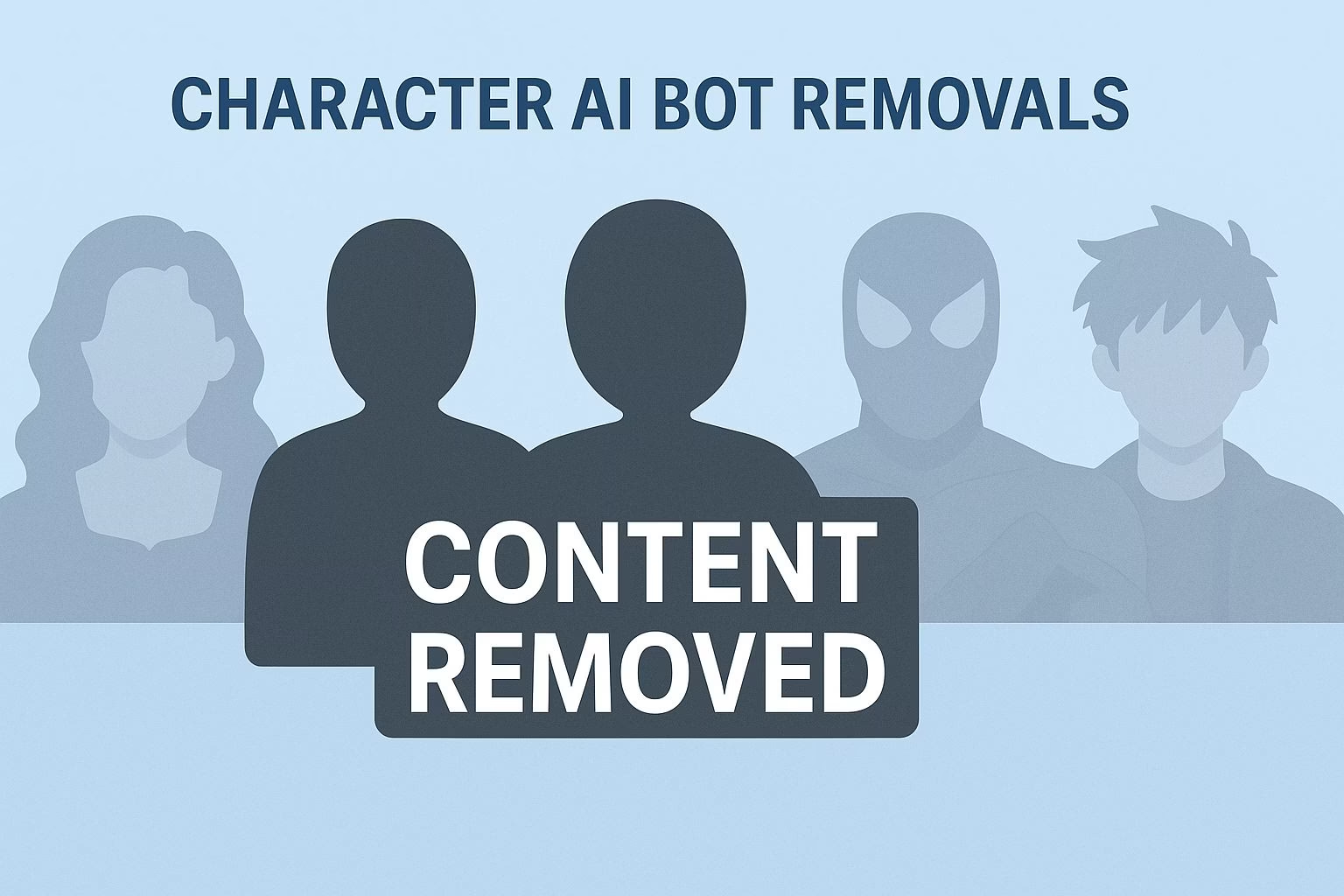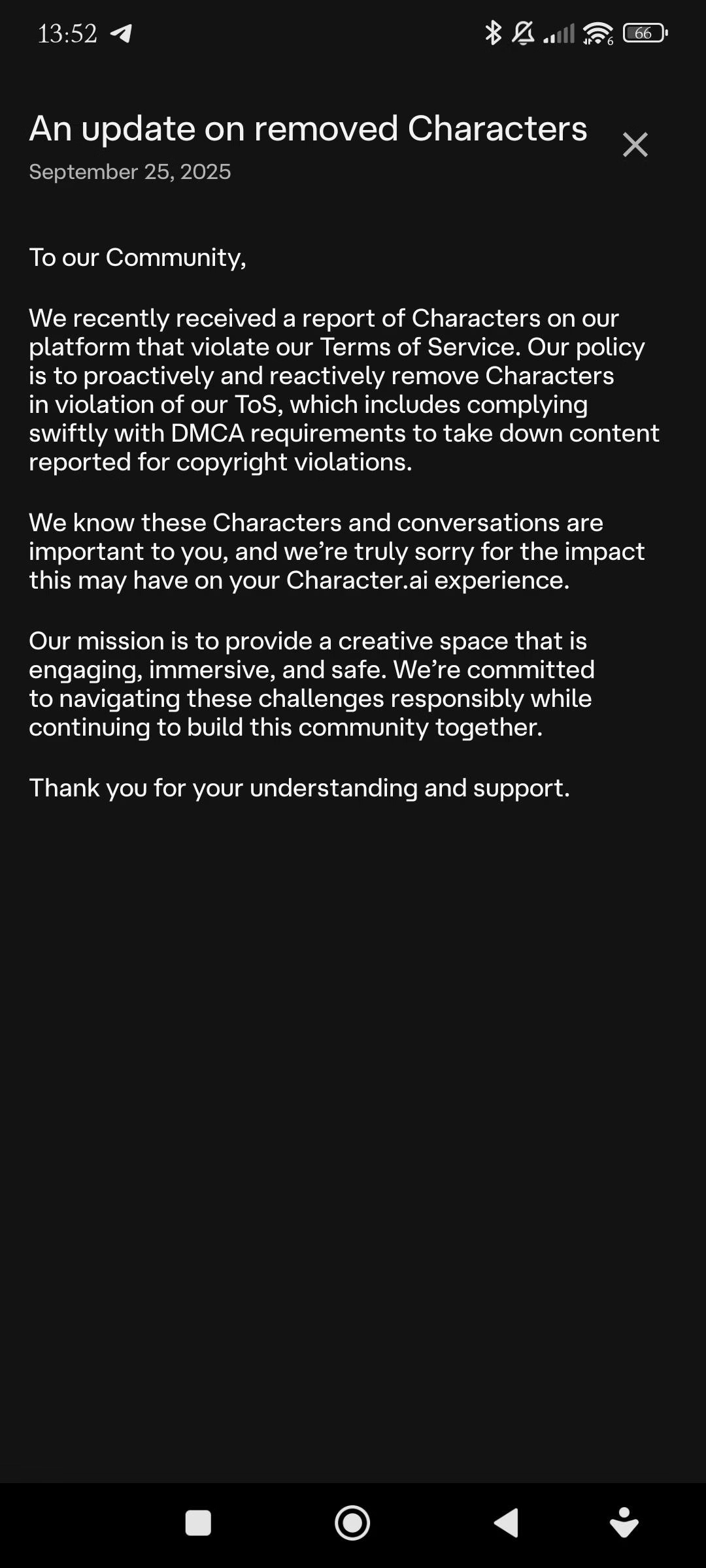Character AI removed popular bots after copyright complaints
Character AI users woke up to a wave of missing bots after the platform announced that it had to take down Characters flagged for copyright violations.
The official message explained that Disney and other major rights holders had filed reports, forcing Character AI to remove content in line with DMCA rules.
This was the first time many users saw such a direct statement from the platform. The news spread quickly, sparking concern that more franchises might disappear.
In a Reddit post, one user pointed out that if companies like Activision demanded removal of Call of Duty bots, “Character AI would lose something like 70% of their people or something.” That fear resonated across the community.
For some, the loss felt personal. One commenter said they had used an X-Men bot for over a year before it vanished.
Others mentioned that bots often serve as an introduction to shows and games they later explore, like Blue Eye Samurai, Rick and Morty, and Call of Duty.
The irony, they argued, is that bots can boost interest in franchises rather than harm them.
Still, copyright law leaves little room for compromise. As one reply noted, Character AI profits from ads and subscriptions, while most bots are built on copyrighted material without permission.
That combination makes the takedowns inevitable.

How users are trying to work around removals
After the first wave of takedowns, users began experimenting with ways to keep their bots alive. Some tried keeping characters private, hoping that hidden bots might escape detection.
That didn’t last long. Reports came in that even private Marvel or Disney bots were being wiped. A few people renamed bots and stripped franchise names from descriptions, but even that felt temporary.
Others turned to external resources. Sites like caibotlist.com started circulating in discussions, offering intros and templates for bots that had been deleted.
This created a kind of underground exchange where creators could rebuild characters outside of Character AI’s official system.
Still, frustration grew. Many users admitted they were cancelling subscriptions or leaving the platform altogether.
The appeal of Character AI for some was the ability to roleplay with well-known characters, not just original creations. Losing that library cut into the platform’s draw.
The result is a split in the community. One side adapts by creating fantasy OCs and bots that avoid copyright. The other side sees little point in staying if recognizable characters are off the table.
Both paths show how fragile trust can be when content is pulled without warning.
The risks for Character AI’s future
The removals highlight a bigger challenge for Character AI. Platforms that rely heavily on user-generated content sit in a legal gray area when copyrighted material is involved.
Disney, Warner Bros, and Nintendo have teams dedicated to protecting their IP. If they see Character AI profiting from unlicensed use, lawsuits are not far behind.
This puts the platform in a difficult position. Removing bots angers users, but leaving them up could risk the entire company.
The fear is that more franchises will follow, leaving Character AI with only generic bots and fan-made OCs. For many, that strips away the main reason they joined.
Alternatives are already on the horizon.
Some users mention tools like Candy AI and CrushOn AI as safer spaces where roleplay feels less restricted.
These services focus more on custom and adult-friendly experiences, which sidestep the copyright minefield.
If Character AI continues losing popular bots, competitors with fewer restrictions may attract the very audience it risks losing.
Why copyright owners are unlikely to negotiate with Character AI

Some users suggested that Character AI should strike deals with companies like Disney to allow fan-made bots.
On paper, this sounds fair, but in practice it’s nearly impossible. Entertainment giants protect their intellectual property aggressively.
Licensing deals are expensive and complex, usually reserved for collaborations that bring in clear revenue.
From the perspective of Disney or Activision, there’s little incentive to allow Character AI users to make free bots of their characters.
These companies already license games, shows, and merchandise for profit. Partnering with a chatbot platform that charges subscriptions and ads would mean giving away valuable rights with little return.
The legal side makes it worse. Even if Character AI wanted to negotiate, the scale is overwhelming. There are hundreds of thousands of bots tied to different franchises.
No single deal could cover them all. Each brand would require separate agreements, and most would walk away rather than risk their reputation.
The harsh truth is that copyright law is not written to favor fans. It prioritizes ownership and control.
That leaves platforms like Character AI with little choice but to comply with takedown requests, even when users argue the bots act as free promotion.
What options users have to keep roleplaying with known characters
With official bots gone, many fans are looking for workarounds.
The first option is renaming or reworking bots so they no longer reference copyrighted names directly.
For example, a Marvel-inspired bot might avoid “Tony Stark” or “Spider-Man” and instead rely on subtle descriptions. This gives some room to recreate the vibe without triggering filters.
Another option is exporting ideas outside Character AI. Communities share prompts and character intros through external sites like caibotlist.com, allowing people to rebuild deleted bots elsewhere.
While not foolproof, it gives roleplayers a sense of continuity.
Finally, some are leaving Character AI entirely. Platforms like Candy AI and CrushOn AI have become alternatives because they don’t restrict adult content and focus more on user freedom.
While these tools don’t officially host copyrighted bots either, they let people build custom experiences without the same tight moderation.
At this point, users face a choice. They can adapt by shifting toward OCs, risk soft workarounds, or move to platforms that place fewer restrictions.
None of these options fully replace the thrill of chatting with a Marvel hero or a video game icon, but they’re the only realistic paths left.
